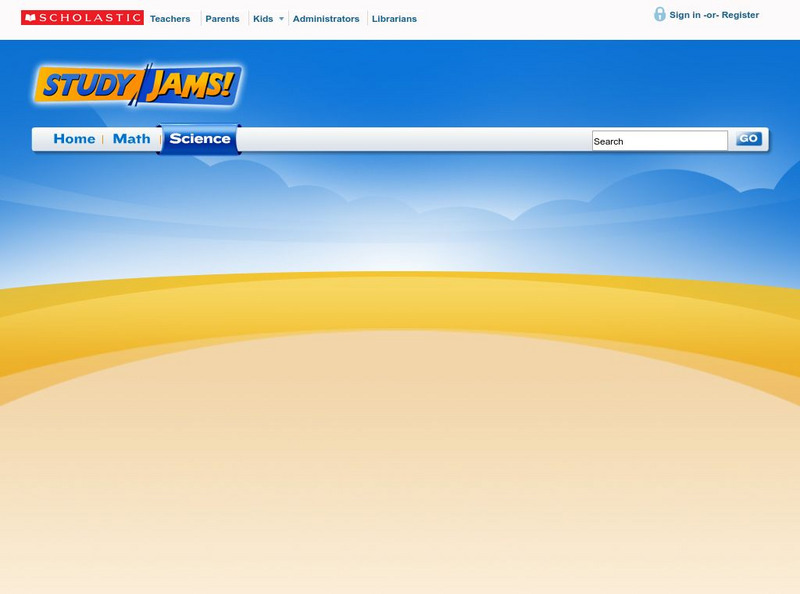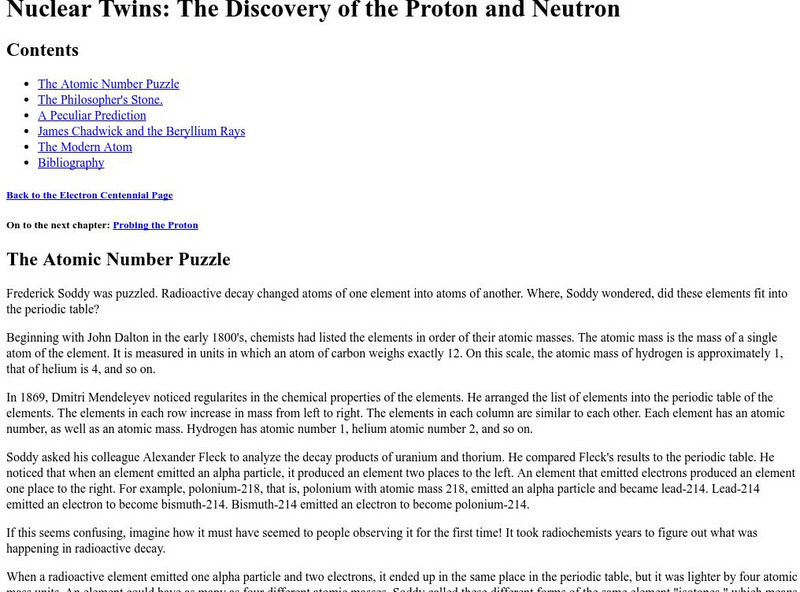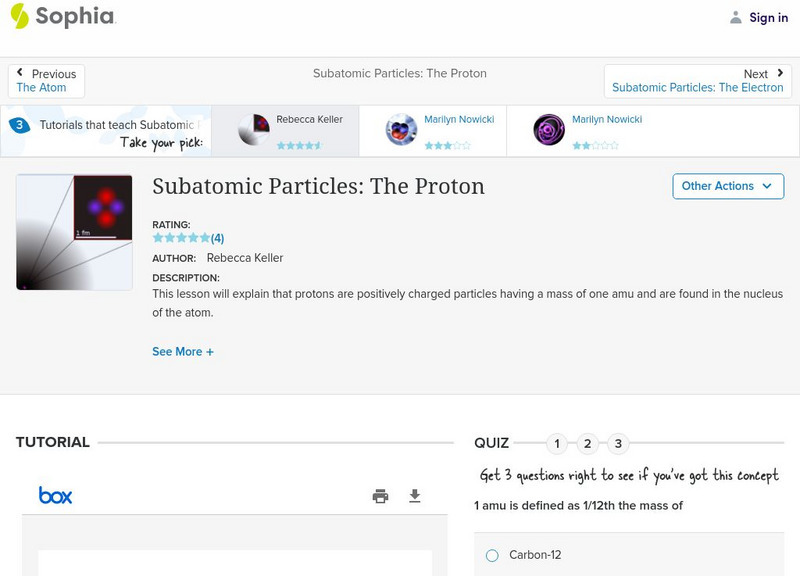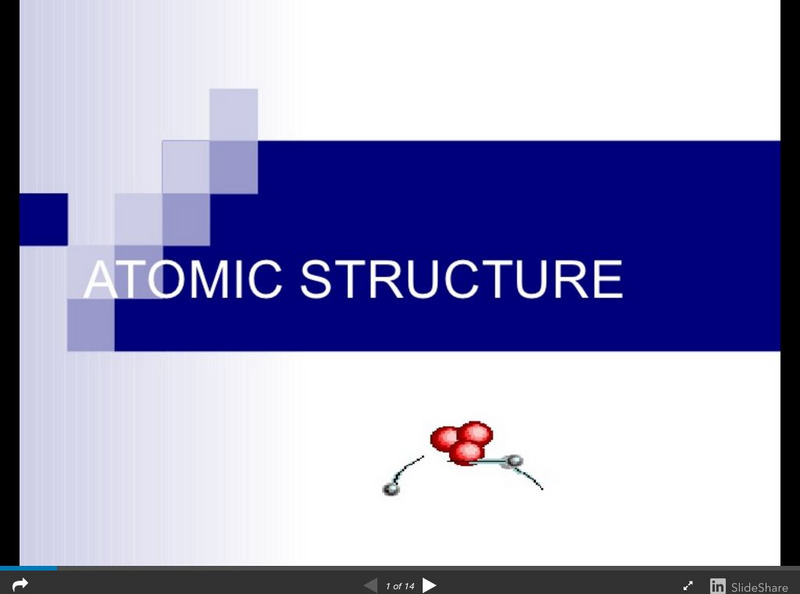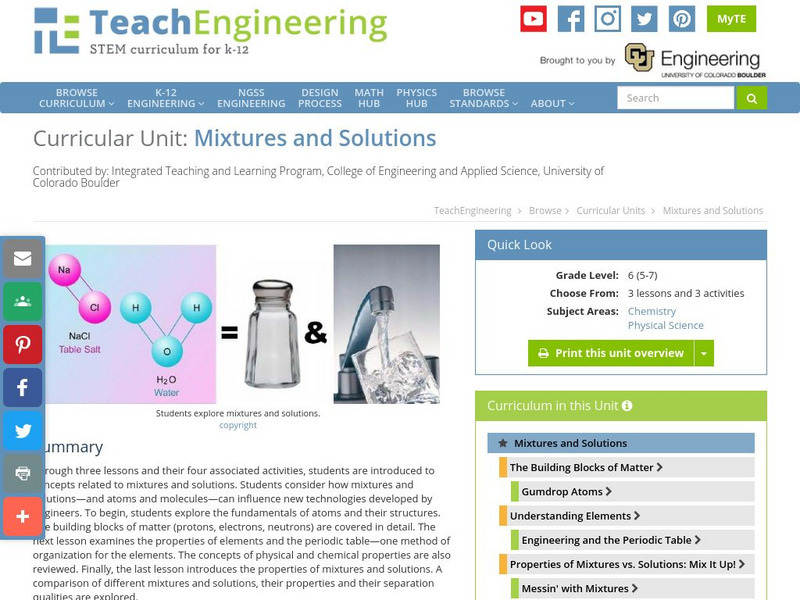Curated OER
Finding the Spot
Fourth graders use circles to "home in" on particular spots, showing the ability of scientists to locate unseen objects in space. This activity shows how scientists know certain objects exist in space due to the forces exerted by...
Curated OER
Popcorn Neutrino Lab
Students parcticipate in a modeling activity that simulates the cyclical role of experimental and theoretical science. Initially, students measure the mass of popcorn. They also record predictions of the mass of the kernels after they...
Curated OER
Basic Chemistry Review
Students experiment to show their knowledge of molecules and atomic structures. In this chemistry review lesson students participate in an activity and then fill out a worksheet.
American Chemical Society
Middle School Chemistry: Protons, Neutrons, and Electrons
Explore the particles that make up atoms: protons, electrons, and electrons.
Science Struck
Science Struck: How to Find Protons, Neutrons and Electrons
Brief explanations of how to determine how many protons, neutrons, and electrons are in an element.
American Chemical Society
Middle School Chemistry: Protons, Neutrons, and Electrons
Investigate why a charged object is attracted or repelled by another charged object. Explore the concept that the attraction between positive protons and negative electrons holds an atom together.
California State University
Csudh Project for Chemistry: Protons, Electrons, and Neutrons
This page is an exercise in relating the number of protons, electrons, and neutrons for an atom or monoatomic ion.
Scholastic
Scholastic: Study Jams! Science: Matter: Atoms: Protons, Neutrons, Electrons
A video and a short quiz on the parts of an atom, the periodic table, and molecules.
Other
Nuclear Twin: The Discovery of the Proton and Neutron
Trace the history of the discovery of protons and neutrons in this informative site.
Sophia Learning
Sophia: Subatomic Particles: The Proton: Lesson 2
This lesson will explain that protons are positively charged particles having a mass of one amu and are found in the nucleus of the atom. It is 2 of 3 in the series titled "Subatomic Particles: The Proton."
Thomas Jefferson National Accelerator Facility
Jefferson Lab: It's Elemental Element Math Game!
Learn how to read the periodic table of elements as you solve these Math questions about the number of protons, neutrons, electrons or nucleons in an atom of an element. You can choose how many questions to answer, and how complex they...
California State University
California State University: Proton, Electron, Neutron
An interesting and useful tool to practice recognition/calculation of atomic number, mass, and number of neutrons, electrons, etc. Can be used with all elements.
Sophia Learning
Sophia: Subatomic Particles: The Electron: Lesson 3
This lesson will explain that electrons are negatively charged particles with negligible mass and are found in pairs in orbitals surrounding the nucleus of an atom. It is 3 of 3 in the series titled "Subatomic Particles: The Electron."
Math Science Nucleus
Math/science Nucleus: Electrons and the Hairy Monster
This animation discusses electrons and the properties of electrons in a storybook format featuring hairy monsters, strange rocks, and fun animations.
Utah Education Network
Uen: Atom in a Bag
Learners will use bags of beads with known quantities of electrons, neutrons and protons to identify the element that they represent.
CK-12 Foundation
Ck 12: Plix: Build Some Helium: Atoms to Molecules
[Free Registration/Login Required] Build your own helium atom and make sure it has the correct number of protons, electrons, and neutrons on this site. Site also includes a small quiz on the topic.
Tom Richey
Slide Share: Atomic Structure
Slideshow looking at the history of models of the atom, including those proposed by John Dalton, J.J. Thomson, Ernest Rutherford, Niels Bohr, and James Chadwick. Discusses subatomic particles, including the numbers of protons, neutrons,...
Sophia Learning
Sophia: Subatomic Particles: The Neutron: Lesson 2
This lesson will explain that neutrons are particles in the nucleus that have no charge and a mass of one amu. It is 2 of 3 in the series titled "Subatomic Particles: The Neutron."
Mocomi & Anibrain Digital Technologies
Mocomi: Structure of an Atom
An atom is made of three parts - protons, neutrons, and electrons. Here you can explore these different parts.
Concord Consortium
Concord Consortium: Atom and Ion Builder
Explore how changing the numbers of protons, neutrons, and electrons affect the type of atom.
University of Colorado
University of Colorado: Ph Et Interactive Simulations: University of Colorado: Build and Atom
Build an atom out of protons, neutrons, and electrons, and see how the element, charge, and mass change. Then play a game to test how the ideas work!
University of Colorado
University of Colorado: Ph Et Interactive Simulations: Build an Atom
Build an atom out of protons, neutrons, and electrons, and see how the element, charge, and mass change. Then play a game to test your ideas!
Utah Education Network
Uen: Atomic Model Construction
Students create models of atoms then compare the various aspects of the atoms including; relative size, charge, positions of subatomic particles, and identity of the atom based on proton, neutron, and electrons with the class.
TeachEngineering
Teach Engineering: Mixtures and Solutions
This unit covers introductory concepts of mixtures and solutions. Students think about how mixtures and solutions, and atoms and molecules can influence new technologies developed by engineers. The first lesson explores the fundamentals...
Other popular searches
- Protons Neutrons Electrons
- Protons, Neutrons, Electrons
- Protons, Electrons, Neutrons
- Electrons, Neutrons, Protons
- Protons Neutrons, Electrons
- Protons Neutrons and Electrons
- Protons , Neutrons, Electrons







